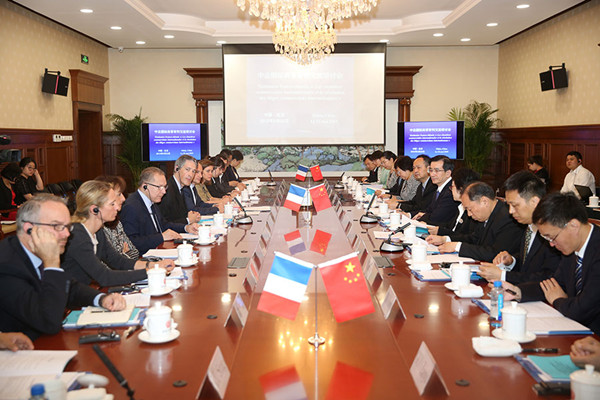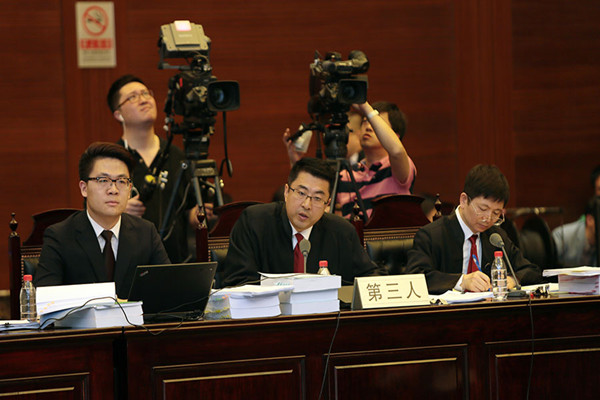Foreign faith in Chinese courts is on the rise
 |
| A seminar about international commercial trails between China and France is held in Beijing on May 22. Provided to China Daily |
Handling of international disputes is earning praise, as the number of BRI cases increases.
Lawyer Shao Jingshu has traveled frequently around the world in recent years to help solve a multitude of foreign disputes. Many relate to maritime and international trade deals stemming from China's expanding global reach.And more Chinese enterprises are seeking her legal advice before extending their businesses overseas, especially as the Belt and Road Initiative and associated projects move forward.
"Some big Chinese logistics companies have asked for my aid in drafting contracts with their foreign partners to avoid any legal risks when they were setting up branches in Southeast Asian nations," said Shao, who works for Rolmax Law Office in Shanghai.
Gao Xiaoli, a senior judge at the Supreme People's Court, said Chinese courts have seen a rapid rise of foreign-related cases, as litigants from home and abroad doing international business place a higher demand on dispute resolution.
Courts across the country heard 63,894 foreign-related commercial or maritime cases from 1978 to 2000, according to statistics from the nation's top court. Over the following 10 years, the figure skyrocketed to 220,080.
"The boom in cases has brought opportunities for Chinese courts to improve their ability to hear the cases," Gao said. "Our equal protection of both parties in the handling of cases has also made more foreign litigants willing to select our courts when they encounter trouble in international investment or trade."
Guo Zhen, an attorney from Fujian province, said China's handling of international commercial cases has been applauded around the world for its increasingly professional judicial teams and efficient legal services.
But all of today's judicial achievements were not easy to come by. Fei Zongyi, 91, a retired judge from the Supreme People's Court, witnessed firsthand both the difficulties and developments of hearing foreign-related cases.
"It's the courage and innovation of judicial pioneers in courts, who made our foreign-related case hearings grow out of nothing, and then become powerful," Fei said.
 |
| A trademark dispute between former basketball star Michael Jordan and a Chinese sports company is heard at the Supreme People's Court in April 2016. Sun Ruofeng / For China Daily |
Open to change
There were few foreign-related disputes in the decades after the founding of the People's Republic of China in 1949, as the country was blocked from the rest of the world, Fei said.
Disputes involving foreign litigants began after the Third Plenary Session of the 11th Central Committee of the Communist Party of China was held in 1978.
At the session, China decided to open its doors to the world and make economic development a priority, Fei said.
The top court established a new division to hear economic cases, including those involving foreign litigants.
"But it was limited in the first years because we had no law and few judicial talents who could deal with foreign-related disputes," Fei said. "We were lost about what we should do."
The retired judge said the situation did not change until 1984, when the country's first conference on economic legal disputes was held.
Fei said it was a turning point for the hearing of foreign-related legal cases, as it clarified that dispute resolution was needed to help promote economic development.
In 1984, Fei was transferred from the top court's research department to the economic division, which was mainly in charge of guiding lower courts' handling of foreign-related maritime, economic and intellectual property disputes.
Fei and his colleagues addressed the handling of maritime cases by setting up special courts and drafting a judicial interpretation on how to seize a foreign ship. The legal document later became a main part of the Chinese Maritime Procedure Law.
At the time, judicial scholars doubted that such an interpretation to seize a ship could be turned into legislation. But Fei said his team persisted as "our maritime case hearings urgently needed a rule".
Chinese enterprises also faced their own legal difficulties when it came to international investment and trade. "Our companies didn't know how to sign foreign-related contracts and had no experience of international purchases, so they suffered losses, such as being cheated by foreign corporations from Germany in the 1980s," Fei said.
As marine transport and international commercial exchanges became more frequent, Chinese companies suffered fewer losses, he said.
Change in direction
The top court set up the economic division in the late 1980s. In 2000, it built a division that specializes in handling foreign-related marine and commercial disputes, said senior judge Gao from the Supreme People's Court.
"Specifying the division was a judicial move to face the globally diversified economic exchanges and to join the World Trade Organization," she said. "Besides, it showed our hearing of foreign-related cases had became professional."
In the 1980s, foreign-related cases heard by Chinese courts focused on contracts, purchases and joint ventures.
Gao said the disputes now emerging are caused by overseas construction projects and equipment purchases. "They are the major problems of Chinese companies going global after the Belt and Road Initiative was pushed forward," she said.
The initiative, proposed by President Xi Jinping in 2013, covers the Silk Road Economic Belt and the 21st Century Maritime Silk Road, with the aim of creating a trade and infrastructure network to connect Asia with Europe and Africa along ancient trade routes.
The top court said Chinese courts resolved about 15,000 foreign-related civil disputes from 2013 to 2017, with BRI-related cases a major component. It also said Chinese courts have always highlighted the equal protection of litigants as a guiding principle, no matter where they were from.
Improved services
As the equal protection has attracted more foreign litigants to solve their international disputes in China, local courts have also taken measures to improve their legal services.
In June 2018, the top court set up international commercial courts in Shenzhen, Guangdong province, and Xi'an, Shaanxi province.
The two courts integrate three different methods - resolution-mediation, arbitration and litigation - into one platform, aiming to more effectively help litigants settle BRI-related cases.
So far, the two courts have accepted 13 international commercial disputes from countries including Japan, Italy and Thailand mainly relating to shareholder verification and earnings distributions, the top court's latest statistics show.
In November 2018, Luo Dongchuan, vice-president of the Supreme People's Court, ordered all judges who handle foreign-related disputes to improve the quality of trials and provide quicker and more convenient legal services for litigants.
Rules on serving foreign litigants did not appear until 1982 in the Chinese Civil Procedure Law. Before that, foreigners were limited in litigations in China, the top court said.
Tongzhou District People's Court in Beijing, for example, has set up a special reception window for foreign litigants, dispatches judges who can speak English to help the litigants understand the court procedures, and also has a room for financial institutions, corporations and individual foreign litigants to file cases.
Some courts in Shanghai, such as the Shanghai Intellectual Property Court and Shanghai Maritime Court, have English-language websites so foreign litigants can follow their cases.
Retired judge Fei said China's hearings of foreign-related cases were now of a leading international standard.
"The better we resolve foreign-related disputes, the more effective it is for us to improve the global credibility of the judiciary," he added.









